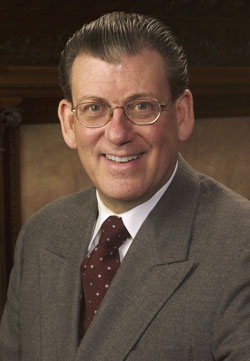ABA committee throws in the towel on new bar pass standard
After several years and as many false starts, an ABA committee has for the time being given up trying to improve upon the existing bar exam requirements in the law school accreditation standards.
The Section of Legal Education and Admissions to the Bar’s standards review committee, which met Friday in conjunction with the ABA Midyear Meeting in Chicago, voted instead to recommend turning the current interpretation on bar passage rates into a standard.
The vote followed a brief presentation by committee member Catherine L. Carpenter, a Southwestern Law School professor who chairs the working group that drafted the proposed new bar pass standard the committee was supposed to consider.
Carpenter said the working group had reluctantly concluded that its draft proposal wasn’t ready to be acted upon because not all jurisdictions currently provide name-specific bar exam results to law schools. Under the draft proposal, a law school would be required to show that 75 percent of its graduates who took a bar exam in the two years after the year of their graduation passed.
Committee chair Jeffrey E. Lewis, professor and dean emeritus of St. Louis University School of Law, also pointed out that the committee is facing its own looming deadline for completing its comprehensive review of the standards.

Photo of Jeffrey Lewis
courtesy of St. Louis
School of Law.
Even if the committee were to take up the draft proposal at Friday’s meeting, Lewis said, it likely wouldn’t be in a position to recommend anything to the section’s governing council, which must approve any changes in the standards, until it meets again in April. And that wouldn’t leave the council enough time to approve any changes in time to be considered by the House of Delegates at the ABA Annual Meeting in August, which the committee has set as its target date for completing its overhaul of the standards.
Any changes in the standards must be reviewed by the House, which can either concur with those changes or refer them back to the council for further consideration. After two such referrals, the council’s decision is final.
“The timing problem is a significant one, at least for us,” Lewis said.
Turning the current interpretation into a standard would preserve the status quo, allow the committee to complete its comprehensive review of the standards on time and buy the committee time until more jurisdictions agree to release name-specific bar pass information to the schools, he said.
The committee unanimously agreed, although committee member Robert J. Cordy Jr., an associate justice of the Massachusetts Supreme Judicial Court, said he would like the record to reflect that it did so while holding its collective nose.
Under the current interpretation – and proposed new standard – a law school can meet the bar pass requirement in one of two ways: Either by showing that 75 percent of its graduates who took the bar exam in at least three of the previous five years passed or by showing that its graduates’ first-time bar pass rate was no more than 15 points below the average bar pass rate for ABA-approved schools in states where its graduates took the bar.
The standards contain the requirements a law school must meet to obtain and retain ABA approval. Interpretations that follow the standards have the same force and effect as a standard, but provide additional guidance concerning the implementation of a standard.
At its meeting Friday, the committee also:
• Voted to recommend eliminating the current prohibition on granting academic credit to a student who participates in a field placement program for which the student receives compensation.
• Reaffirmed its previous decision to recommend raising the experiential learning requirement from one credit hour to six credit hours. The council has posted two such proposals for notice and comment: The one previously recommended by the committee and one which would increase the experiential learning requirement to 15 credit hours.
• Declined to wade back into the debate over whether to eliminate tenure as an accreditation requirement.
• Decided not to quantify the standard that says a law school should provide students with “substantial opportunities” to participate in pro bono legal services or law-related public service activities.



